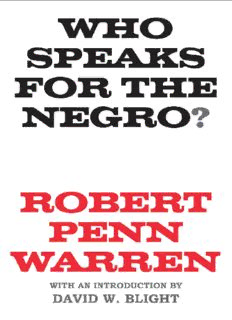
Who Speaks for the Negro? PDF
Preview Who Speaks for the Negro?
Who Speaks for the Negro? This page intentionally left blank WHO SPEAKS FOR THE NEGRO? Robert Penn Warren With an Introduction by David W. Blight Yale UNIVERSITY PRESS New Haven and London Published with assistance from the foundation established in memory of James Wesley Cooper of the Class of 1865, Yale College. 1965 edition published by Random House. 1993 copyright renewed, Eleanor Clark Warren. Reprinted by Yale University 2014. Introduction copyright © 2014 by David W. Blight. All rights reserved. This book may not be reproduced, in whole or in part, including illustrations, in any form (beyond that copying permitted by Sections 107 and 108 of the U.S. Copyright Law and except by reviewers for the public press), without written permission from the publishers. Yale University Press books may be purchased in quantity for educational, business, or promotional use. For information, please e-mail [email protected] (U.S. office) or [email protected] (U.K. office). The author and publisher wish to thank the following for permission to use material quoted: DIAL PRESS, INC. Nobody Knows My Name by James Baldwin, Copyright © 1961 by James Baldwin; and "Down at the Cross: Letter from a Region in My Mind" from The Fire Next Time by James Baldwin, which appeared in The New Yorker, November 17, 1962. FIDES PUBLISHERS, INC. The New Negro, edited by M. H. Ahmann. GROVE PRESS, INC. The Subterraneans by Jack Kerouac. Copyright © 1958 by Jack Kerouac. OXFORD UNIVERSITYPRESS LTD. Race and Colour in the Carribean by G. R. Coulthard. STUDENT NONVIOLENT COORDINATING COMMITTEE The Graham letter, originally published in the Student Voice publication. THE CONDE NAST PUBLICATIONS INC. "Disturbers of the Peace: James Baldwin" by Eve Auchincloss and Nancy Lynch Handy (Mademoiselle, May '63). Copyright © 1963 by The Conde Nast Publications, Inc. THE VILLAGE VOICE "View of the Back of the Bus" by Marlene Nadie. Copyright 1963 by The Village Voice, Inc. WORLD PUBLISHING COMPANY The Mark of Oppression by Abram Kardiner and Lionel Ove- sey. A Meridian Book. Design by Tere LoPrete. Printed in the United States of America. Library of Congress Control Number: 2014932435 ISBN 978-0-300-20510-7 (pbk.) A catalogue record for this book is available from the British Library. 10 9 8 7 6 5 4 3 21 With thanks to all those who speak here I believe that the future will be merciful to us all. Revolutionist and reactionary, victim and executioner, betrayer and betrayed, they shall all be pitied together when the light breaks . . . A character in Under Western Eyes, by JOSEPH CONRAD Contents Note on thé Digital Archive, by Mona Frederick IX Introduction, by David W. Blight xi Foreword xxxiii Chapterl THE CLEFT STICK 3 Chapterll A MISSISSIPPI JOURNAL 44 ChapterlII THE BIG BRASS 132 ChapterlV LEADERSHIP FROM THE PERIPHERY 268 ChapterV THE YOUNG 355 ChapterVI CONVERSATION PIECE 405 Index 445 This page intentionally left blank Note on the Digital Archive The original audiotapes and other research materials related to Robert Perm Warren's Who Speaks for the Negro? are held by the University of Kentucky and the Yale University Libraries. In cooperation with these institutions, the Robert Perm Warren Center for the Humanities and the Jean and Alexander Heard Libraries at Vanderbilt University created a complete digital archive, which is fully searchable and available to the public at http://whospeaks.library.vanderbilt.edu/. The Who Speaks for the Negro ? Digital Archive consists of the original reel-to-reel recordings that Warren compiled for each of his interviewees. In addition, it incorporates all print materials—transcripts, letters, book reviews, and more—related to the project. The archive also includes inter- views that are not in the book (for example, a conversation with Séptima Clark). Readers of Who Speaks for the Negro? are invited to listen to the original interviews and peruse the related documents in order to deepen their understanding of the project, its characters, and the historical period from which it emerged. Mona Frederick, Executive Director Robert Perm Warren Center for the Humanities Vanderbilt University
Description: